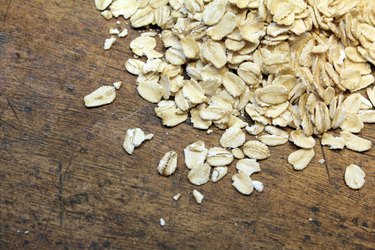
Oatmeal is a simple, inexpensive breakfast choice that can make a significant difference in your health. In 1997, the Food and Drug Administration made the first food-specific health claim for oatmeal, allowing Quaker Oats to display this claim on product packaging: "Soluble fiber from oatmeal as part of a low saturated fat, low cholesterol diet, may reduce the risk of heart disease." In 2008, the website Science Daily reported that studies conducted in the decade following the initial health claim reaffirmed the benefits of eating oatmeal.
Company History
Video of the Day
The packaging of oats as a breakfast cereal began in 1856, when Ohio oat factory owner Ferdinand Schumacher attempted to market a product which up to that time in America was viewed as food for animals. Another oat marketer, Henry Parsons Crowell, owner of the Quaker Mill in Ravenna, Ohio, registered the "figure of a man in Quaker garb" as a trademark symbol in 1866. The Quakers, or Religious Society of Friends, played no role in the production of the Quaker brand of oats, according to the website Funding Universe. After a number of American oat millers consolidated under different names, American Cereal Company changed its name to Quaker Oats Company in 1901.
Video of the Day
Company Brands
Quaker Oats introduced the familiar cylindrical oatmeal box in 1915, and in 1922 marketed Quaker Quick Oats, one of the first convenience products. Today, the Quaker Oats Company produces a wide variety of cereal products, including Life, Oatmeal Squares, Puffed Wheat, Puffed Rice, Honey Graham Oh's and Simple Harvest. Quaker Oats snack foods include granola bars and rice snacks.
Oat Parts
Each kernel of oat consists of four parts. The hull, or outer covering, is inedible and removed during the milling process. The coarse outer layer of the kernel, or bran, is the part containing soluble fiber. The largest part of the kernel, containing carbohydrates and protein, is the endosperm. At the heart of the kernel is the nutrient-filled germ, according to the Quaker Oats website.
Cholesterol
Many scientific studies have confirmed that oatmeal lowers low-density lipoprotein or "bad" cholesterol. Cholesterol, which is manufactured by your liver, plays an important role in your health. But too much cholesterol can damage arteries and lead to heart disease. Oatmeal's soluble fibers act like a sponge, binding with cholesterol in the digestive tract and naturally removing it from the body.
Fiber
Oats are an important source of both soluble and insoluble fiber. Soluble fiber, such as is found in oats and oat bran, apples and carrots, dissolves in water. It is valuable for helping to maintain healthy blood sugar levels as well as for lowering blood cholesterol level. Insoluble fiber, which does not dissolve in water, is found in oats and other whole grains and promotes a healthy digestive system. Quaker oatmeal, both the old-fashioned and quick varieties, contain four total grams of fiber and two grams of soluble fiber per serving.